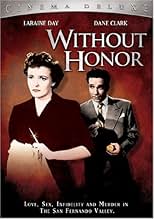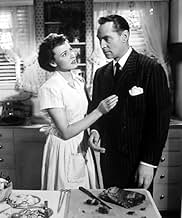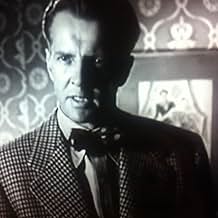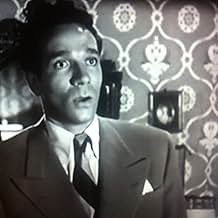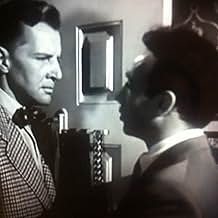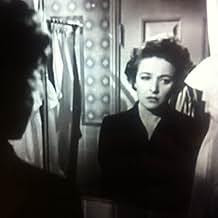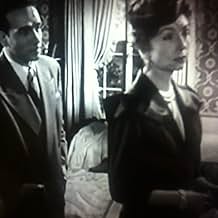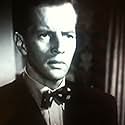Jane Bandle has recently married, but Bill, her husband's brother, tries to wreck her marriage because Jane rejected his sexual advances before her marriage.Jane Bandle has recently married, but Bill, her husband's brother, tries to wreck her marriage because Jane rejected his sexual advances before her marriage.Jane Bandle has recently married, but Bill, her husband's brother, tries to wreck her marriage because Jane rejected his sexual advances before her marriage.
- Awards
- 1 nomination total
Marjorie Stapp
- Neighbor's Wife
- (as Margie Stapp)
Irving Pichel
- Narrator
- (voice)
- (uncredited)
- Director
- Writer
- All cast & crew
- Production, box office & more at IMDbPro
Featured reviews
Wild film.
Laraine Day as Jane is cheating on her husband (Bruce Bennett) with Franchot Tone. However, he breaks up with her, and during a struggle, she kills him.
While he is dead in another room, her brother-in-law (Dane Clark) shows up. He wanted her at one point, but she rejected him.
So he has called a revenge meeting, inviting the dead man's wife and the dead man himself, not realizing it a bit late for that, planning to surprise his brother with the news that his wife is a cheat.
Given that the man is dead, there are other surprises in store.
Laraine Day, understandably, plays a totally wired and half-hysterical woman. She does a good job, but the film feels off balance and frantic. Dane Clark's character clearly has a screw loose.
I would call this an odd film. And how much did they pay Franchot Tone to spend all that time on the floor?
Laraine Day as Jane is cheating on her husband (Bruce Bennett) with Franchot Tone. However, he breaks up with her, and during a struggle, she kills him.
While he is dead in another room, her brother-in-law (Dane Clark) shows up. He wanted her at one point, but she rejected him.
So he has called a revenge meeting, inviting the dead man's wife and the dead man himself, not realizing it a bit late for that, planning to surprise his brother with the news that his wife is a cheat.
Given that the man is dead, there are other surprises in store.
Laraine Day, understandably, plays a totally wired and half-hysterical woman. She does a good job, but the film feels off balance and frantic. Dane Clark's character clearly has a screw loose.
I would call this an odd film. And how much did they pay Franchot Tone to spend all that time on the floor?
The problems that may be inherent in the story were made worse because the then-still-somewhat-powerful arbiters of censorship gave the film a rough time. The objection, I would assume, resulted from the fact that the Laraine Day character is allowed to live and not 'pay for her almost-fatal-act-of-murder'. Day didn't always get a chance to grab the parts that lead to awards, but she is more than good in this one. Sorry to contradict one of the earlier writers on the piece, but the worst acting in the film, and the only truly awful performance, is the one by Agnes Moorehead, wearing an outfit that could have come from Ed Wood. This is far from an unwatchable film... it does have suspense...and the ending is surprising in denouement. It is forgotten, I admit, but this film did earn considerable attention in the news regarding its producers' fights to get it released without disastrous cuts. Thus, a moment in the censorship issues that were finally blasted apart by people like Otto Preminger.
Watch carefully. Lorraine Day has very few lines in this movie. She did most of her acting by facial expressions responding to the other actor's long monologues (Clark & Moorehead). Pichel got the best out her.
Without Honor is directed by Irving Pichel and written by James Pope. It stars Dane Clark, Laraine Day, Franchot Tone and Agnes Moorehead. Music is by Max Steiner and cinematography by Lionel Lindon.
A mixed bag on offer in this one, where a broth of "sins" is stirred suitably in predominantly one location. Set-up bares a striking resemblance to Hitchcock's Rope released the previous year, where a group of characters are thrust together in one living room deconstructing their sins, shattered dreams and ulterior motives - all while a supposed dead body lays prone in one of the bedrooms.
The thematics at work are prime film noir, adultery, suicide attempt, sexual aggression, jealous agenda, duping and etc, all of which only comes to life half way through the piece. Here in is the problem, the pic asks for a lot of patience from the viewer before really getting going, which although the character group dynamic is pungent with an unsavoury odour, it never fully gets out of first gear.
Things aren't helped by the flat visual look of the piece, where with the story set in daytime, we yearn for a bit of noir flourish from one of the ace noir photographers of the time. Then there's Steiner's score, which is a cracker, ebullience in abundance, only it's in the wrong film! Moorehead is wasted in what is ultimately a walk on passive role, but at least Clark and Day nail the traits of their respective characters.
No hidden gem here, and noir hunters should be advised this is only noir from a plot perspective, but enough damaged human conditioning here to make it above average. 6.5/10
A mixed bag on offer in this one, where a broth of "sins" is stirred suitably in predominantly one location. Set-up bares a striking resemblance to Hitchcock's Rope released the previous year, where a group of characters are thrust together in one living room deconstructing their sins, shattered dreams and ulterior motives - all while a supposed dead body lays prone in one of the bedrooms.
The thematics at work are prime film noir, adultery, suicide attempt, sexual aggression, jealous agenda, duping and etc, all of which only comes to life half way through the piece. Here in is the problem, the pic asks for a lot of patience from the viewer before really getting going, which although the character group dynamic is pungent with an unsavoury odour, it never fully gets out of first gear.
Things aren't helped by the flat visual look of the piece, where with the story set in daytime, we yearn for a bit of noir flourish from one of the ace noir photographers of the time. Then there's Steiner's score, which is a cracker, ebullience in abundance, only it's in the wrong film! Moorehead is wasted in what is ultimately a walk on passive role, but at least Clark and Day nail the traits of their respective characters.
No hidden gem here, and noir hunters should be advised this is only noir from a plot perspective, but enough damaged human conditioning here to make it above average. 6.5/10
This Odd Film is Loaded with Edgy Entertainment that Challenged Censors.
In this Downbeat Norish Drama it Confronts Head-On... Adultery, Murder, Suicide, and a Bi-Sexual Incestuous Obsession.
The Wordy Script Takes Place in One Location in a Few Rooms.
With Loraine Day Giving a Difficult Almost Wordless Performance.
The Writing is Sharp and the Performances are Top B-Movie Gold.
The Film's Downfall, if it has one, is the Constant Verbiage and Run-On Dialog by Dane Clark.
It is the Antithesis of Day's Silent Portrayal.
Clark's Constant Jabbering is a Dated, Nervous, Non-Stop Accosting of His Brother's (Bruce Bennett) Wife and His Brother.
He Reveals an Unhealthy Attachment to His Sibling.
Also an Equal Hatred for and Jealousy of Loraine Day.
His Actions are Loathsome and Neurotic.
With Relentless Force and those Dated Antics may be Difficult for some Viewers to Watch.
Along with Bennett, Agnes Moorehead, in a Minor but Crucial Role is Outstanding, but so is the Entire Cast.
Underlined by Max Steiner's Striking Score and a Plot Twist or Two.
The Ensemble Production Manages to Compel the Overloaded Story. And Bring it Together for a Strange and Unique Viewing Experience, Especially in 1949.
Above Average and Certainly...
Worth a Watch.
In this Downbeat Norish Drama it Confronts Head-On... Adultery, Murder, Suicide, and a Bi-Sexual Incestuous Obsession.
The Wordy Script Takes Place in One Location in a Few Rooms.
With Loraine Day Giving a Difficult Almost Wordless Performance.
The Writing is Sharp and the Performances are Top B-Movie Gold.
The Film's Downfall, if it has one, is the Constant Verbiage and Run-On Dialog by Dane Clark.
It is the Antithesis of Day's Silent Portrayal.
Clark's Constant Jabbering is a Dated, Nervous, Non-Stop Accosting of His Brother's (Bruce Bennett) Wife and His Brother.
He Reveals an Unhealthy Attachment to His Sibling.
Also an Equal Hatred for and Jealousy of Loraine Day.
His Actions are Loathsome and Neurotic.
With Relentless Force and those Dated Antics may be Difficult for some Viewers to Watch.
Along with Bennett, Agnes Moorehead, in a Minor but Crucial Role is Outstanding, but so is the Entire Cast.
Underlined by Max Steiner's Striking Score and a Plot Twist or Two.
The Ensemble Production Manages to Compel the Overloaded Story. And Bring it Together for a Strange and Unique Viewing Experience, Especially in 1949.
Above Average and Certainly...
Worth a Watch.
Did you know
- TriviaThis film offers a rare glimpse at a contemporary 1949 television set, a bulky table model with a ten-inch rectangular screen, which commonly was required to be "set up" by qualified technicians who also needed to install an antenna on the roof before proper reception could be achieved. Commercial television broadcasts had begun in Los Angeles two years earlier in 1947 on KTLA (Channel 5).
- GoofsJane is said to have broken a heel In the fall that caused her to miss her escape by bus, but as she picks up a broken heel off the ground and carries it with her, the heels on the shoes on both her feet remain intact and attached.
- Quotes
Fred Bandle: [picking Jane up on the dusty road, oblivious to her foiled attempt at escape] Where were you? Out for a walk? You busted a heel, huh? Well you shouldn't wear heels on a street like this.
Details
- Runtime1 hour 9 minutes
- Color
- Aspect ratio
- 1.37 : 1
Contribute to this page
Suggest an edit or add missing content

